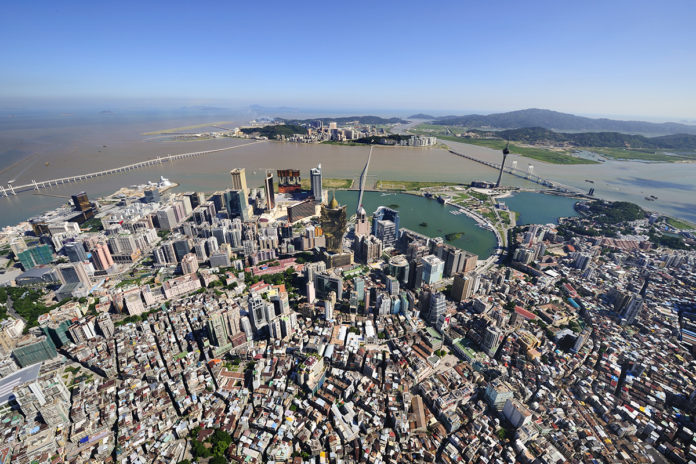Macau and Hengqin Island, which at 106 square kilometres in length is the biggest of the 146 islands in neighbouring Zhuhai, seem to be growing closer and closer, even though a bridge has linked Macau to Hengqin for several years already. First came the announcement that the new University of Macau campus would be built there. Then, the government and its Zhuhai counterpart announced the establishment of the joint Chinese Medical Technology Industrial Park on the island, with construction due to start this year. Now there are plans for further joint projects by Macau and Zhuhai, in the meetings, incentives convention and exhibitions industry and in cultural industries. Several Macau businessmen have shown interest in investing there. In early 2009, about one third of the more than 100 proposals received by Zhuhai officials for projects to develop Hengqin had come from Macau. Can Hengqin solve Macau’s two biggest problems: a lack of land and the need to diversify its economy? The answer is still unclear but several academics and entrepreneurs, not to mention the government, seem to be bullish. Hengqin has been regarded as an area that Macau could expand into since the days of Portuguese rule. In 2005, the decision was taken to forge closer links between Macau and the island, when Guangdong began encouraging investment from Hong Kong and Macau. But it was not until 2009, after a Las Vegas Sands project for the island was put on ice, that things began to happen. Into the jungleFirst, in June 2009, the Macau government officially announced that the new campus of the University of Macau was going to be built in there. The campus, still under construction, will be connected to Macau by a tunnel. Significantly, the campus will be under the Macau SAR’s jurisdiction and everyone from Macau will be allowed to access it without having to pass through any border controls. Macau’s lease on the land runs until 2049. Then, in August 2009, the central government made Hengqin China’s third “state-level strategic new zone”, after Pudong in Shanghai and Binhai in Tianjin. “Hengqin Island marks the beginning of a new kind of cooperation between Macau and Zhuhai, with coordinated direction. That matches the development strategy of the country, as well as helping Macau to diversify its economic structure,” says economist Henry Lei. Macau investment in Hengqin “helps the territory to overcome the constraint of insufficient land and human resources” and “construct the future growth engine for the economy,” he says. Plans to develop Hengqin Island envisage investment of at least RMB100 billion (MOP121 billion or US$15 billion) by 2020, with RMB70 billion being invested in the next three years. The construction of the new campus of the University of Macau alone entails investment of RMB6 billion. Macau businessman Lionel Leong Vai Tac says the island offers good prospects for small and medium enterprises (SMEs) which “have become very important for Macau’s development”. He says that the government should use public funds to help SMEs to invest there. If the government lets SMEs invest individually, “they will definitely be beaten” by the competition. “It’s a jungle out there,” he says. Different focusBy becoming “a pioneer or even a guardian angel for Macau’s SMEs” the government would help diversify the economy and improve the city’s competitiveness, according to Mr Leong. “Regional cooperation is something new to us but if we don’t start now we will never start.” He says the government should not allow the big casino companies to snap up all the business opportunities on Hengqin. “What is the meaning of ‘diversify’ if it goes back to gaming again, right?” Legislator Ng Kuok Cheong says Hengqin is “a gift and a very important opportunity for economic development”. Projects mooted for the island include a high technology park, a creative industries park, a power station, a water park, a new business centre and housing. Investing in Hengqin Island is also “a chance for Macau to provide economic feedback to Zhuhai, Guangdong and the mainland, in order to maintain support from them,” Mr Ng says. Will investors be discouraged by the failure of the Zhuhai-Macau Cross-Border Industrial Park, officially inaugurated in 2006? “The projects in Hengqin Island are different from the Zhuhai-Macau Cross-Border Industrial Park in terms of their focus,” says Mr Lei. “The new cooperation emphasises creative industries, high-tech sectors and high value-added areas, which are not exactly labour intensive.” Freedom of movementHe concedes that the projects mooted for Hengqin may be less competitive in the short term, entail a much longer investment period and probably higher risk. “It may be too early to comment on the chance of success for these projects since we do not know the details of them. However, it still makes sense, as they are not duplicating the existing cross-border industrial zone.” Political analyst Larry So says there is potential on Hengqin for property development and the establishment of creative industries. “In terms of residential properties, we need more space to live in and we have been waiting for a very long time for housing,” he says. Mr So suggests Macau could join hands with Chinese investors to seize the real estate opportunities on the island. “Our middle class is rising. They want better housing and they’re relying on the government.” Mr So believes creative industries have potential because they are related to academia, which already has a foothold on Hengqin. Mr Lei adds that low rents on the islands may also help creative industries. But Mr So says these opportunities come with a caveat: “Hengqin is a good place but we do have a very basic assumption that we will be able to move there freely. And if we don’t provide the proper infrastructure to support the traffic and all, we can forget about efficiency.” Zhuhai and Macau have already asked Beijing to allow the Macau-Hengqin border crossing to stay open 24 hours a day, without the kind of restrictions that handicap the Cross-Border Industrial Park. Chief Executive Fernando Chui Sai On said last month that Macau and Guangdong had reached consensus on gradually lengthening the working hours of customs services. The ultimate goal is to provide round-the-clock services, he said, but no timetable has been set.
—
























